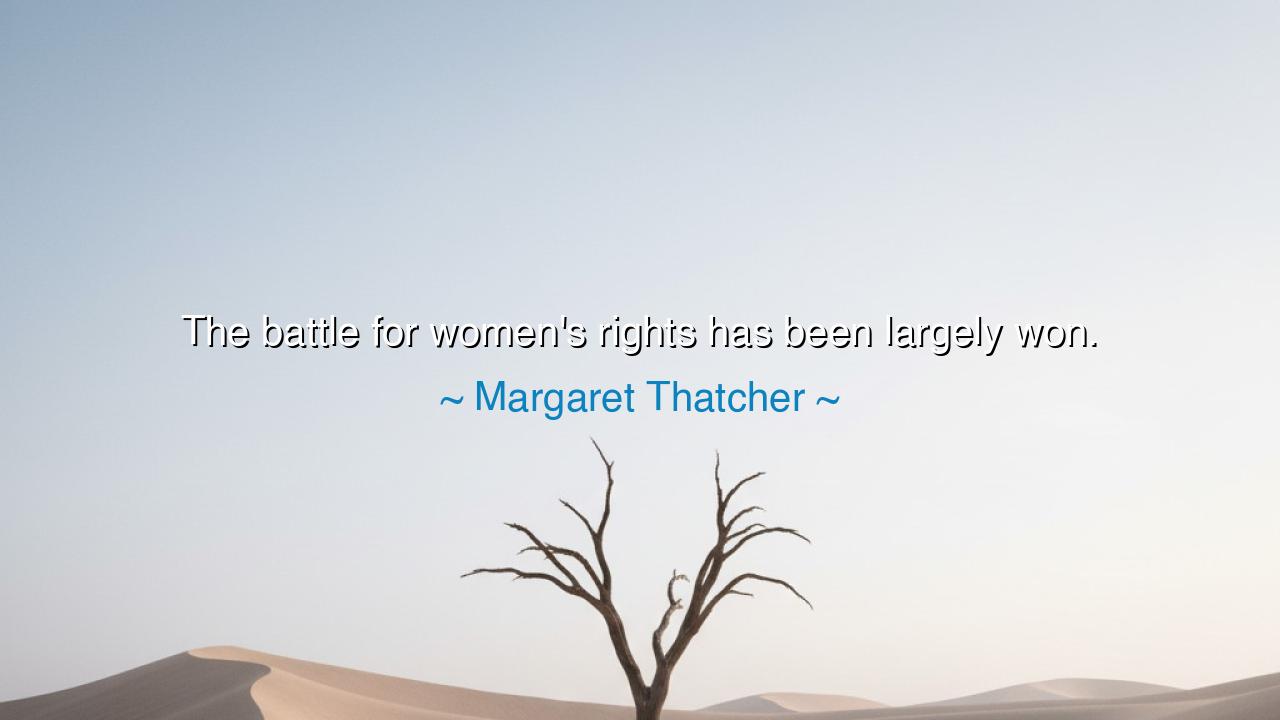
The battle for women's rights has been largely won.






"The battle for women’s rights has been largely won." Thus proclaimed Margaret Thatcher, the Iron Lady, whose own life was a testament to how far women had come in their struggle for dignity and place. When she spoke these words, she was not dismissing the struggle of women, nor the sacrifices of those who came before her. Rather, she declared a moment of triumph: that the chains once fastened so tightly had, in her time, been broken or loosened, and that women now stood with power to shape their destinies. Her words rang both as a celebration of victories past and a challenge to use those victories wisely.
The origin of this wisdom lies in centuries of struggle. Once, women were denied voice in the councils of nations, denied the right to learn, to own, to vote, to govern. They were told their sphere was the home, their destiny no larger than the hearth. But across the ages, women rose: they taught, they healed, they labored, and finally, they demanded their rightful place. From the suffragettes who marched in the streets to the reformers who wrote with fiery pens, the battle for rights was waged with courage and sacrifice. Thatcher herself, ascending to the highest office of her land, stood as a symbol that such struggles had borne fruit.
Consider the story of Emmeline Pankhurst, the leader of the British suffragette movement. She and her daughters endured prison, hunger strikes, and public scorn, all for the right of women to vote. What seemed impossible in her day was achieved within a generation. Without such sacrifices, Thatcher could not have risen to power, nor could her words have carried weight. It was upon the shoulders of such warriors that later women stood, their rights secured by blood, sacrifice, and unyielding will.
Yet Thatcher’s declaration is also tinged with warning. To say the battle is largely won is not to say it is fully complete. The victories of law and custom may be achieved, but the deeper struggle lies within the hearts of men and women. Prejudice lingers, traditions resist, and new forms of inequality creep into life like shadows at sunset. If the victors grow complacent, if they rest too easily upon the laurels of past triumphs, the ground gained can be lost. Thus, her words summon both pride and vigilance.
This truth is both heroic and humbling. Heroic, because it reminds us that struggles once thought impossible can be conquered. Humbling, because it reminds us that freedom is never absolute, but must be guarded, nourished, and renewed with every generation. The rights of women are not gifts granted from above; they are the hard-won treasures carved from centuries of silence and struggle. To say they are “largely won” is to honor those who fought and to urge the heirs of that battle not to squander the inheritance.
The lesson, then, is clear: celebrate victories, but never cease to watch the horizon. Let women use their freedom not only for themselves, but for the good of all society. Let them lead, invent, teach, heal, and dream, so that the world may taste the full sweetness of their contributions. Let men, too, honor these victories, understanding that the liberation of women is the liberation of humanity itself, for when half of the human race is silenced, all are diminished.
What practical steps, then, shall we take? Teach young girls the history of those who fought for them, so they may know the price of their freedom. Teach young boys to see in their sisters and mothers not weakness, but equals in strength and worth. Guard the workplace, the halls of learning, and the courts of justice, so that opportunity flows freely to both women and men. And above all, let gratitude fuel vigilance, so that the freedoms won are never forgotten, never diminished.
So let Thatcher’s words echo across the generations: the battle for women’s rights has been largely won—but the torch must be carried still. For each generation must guard what was gained, and press onward until justice, dignity, and opportunity are secured not for most, but for all. Only then will the battle truly be complete, and only then will humanity stand in the fullness of its strength.






AAdministratorAdministrator
Welcome, honored guests. Please leave a comment, we will respond soon